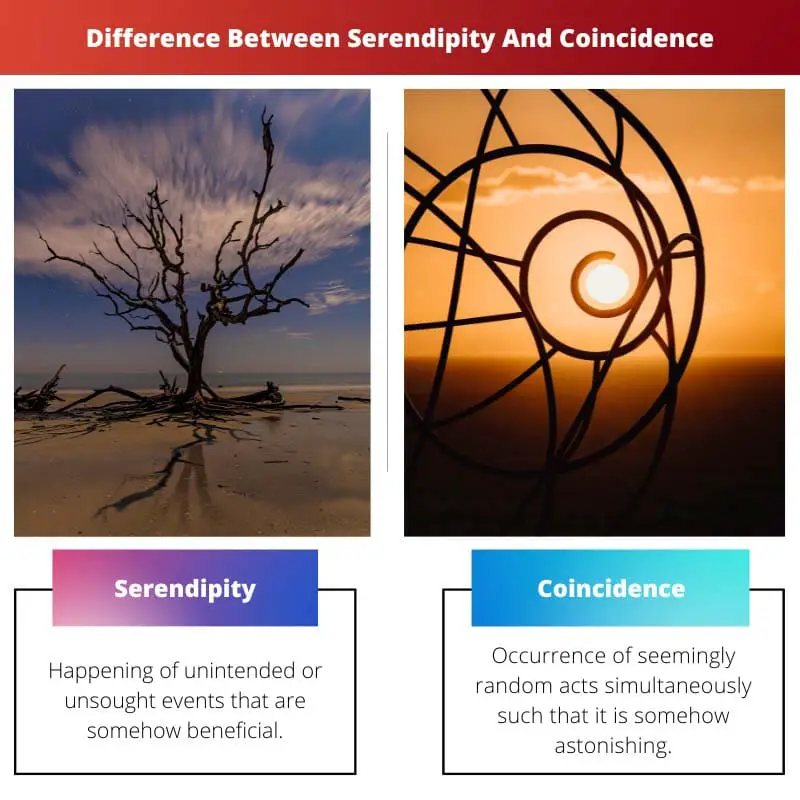Estimates suggest that there are around one million words in English. However, the exact numbers vary from one prediction to another as English is rapidly evolving and because there are no defined rules for counting.
But, the one thing that is defined is to get confused between the meanings of these words.
Key Takeaways
- Serendipity involves the unexpected discovery of something valuable or beneficial, resulting from chance encounters or accidents.
- Coincidence occurs when two or more unrelated events happen simultaneously or in close succession without any apparent causal connection.
- Serendipity is associated with positive outcomes and personal growth, whereas coincidence can be neutral or carry no particular significance.
Serendipity vs Coincidence
The difference between Serendipity and Coincidence is that Serendipity is when something unexpected happens, and it is somehow fortunate and beneficial. On the other hand, a Coincidence is the occurrence of two or more good or harmful acts such that there isn’t a clearly defined connection between them.

Serendipity is a fortunate event that was unintended and completely unexpected.
In other words, Serendipity is when miraculously good things happen without any expectations or intentions, and they change the course of someone’s life for good.
For example, many great discoveries and inventions were unintended, bringing good changes in humanity.
Coincidence is described as the simultaneous occurrence of two or more acts in a way that an obvious connection can’t be established between them.
However, if someone looks superficially, they might find a link between those separate acts. Also, a Coincidence isn’t always determined as good; therefore, it can have adverse effects.
Comparison Table
| Parameters of Comparison | Serendipity | Coincidence |
|---|---|---|
| Definition | Happening of unintended or unsought events that are somehow beneficial | Occurrence of seemingly random acts simultaneously such that it is somehow astonishing |
| Etymology | Coined by Horace Walpole in a fairy tale in 1754 | Originated from medieval Latin word coincidere meaning “agree” or “coincide.” |
| Type of event | Always good | Good or bad |
| Number of events | Serendipity can happen in one or more events. | A Coincidence always happens between two or more events. |
| Connection with thoughts | Serendipity isn’t connected with the thoughts of whomever it happens with | Coincidence involves superficial connections |
What is Serendipity?
Serendipity is defined as an unintended event that is advantageous and fortunate to whomever it happens with and helps them grow.
Serendipity is also described as the conduct of unsought circumstances that create a beneficial and helpful environment. In any case, a serendipitous event is both unexpected and pleasing.
“Serendipity” was first mentioned in a fairy tale titled “The Three Princes of Serendip.” Horace Walpole wrote this story in 1754. Serendip is the ancient name for the island of Sri Lanka located on the southern coast of India.
A king sends his sons to travel outside the country and gain experience in the story. The princes come across highly unexpected but favorable moments during their journey, which the author coined as “Serendipity.”
There are two types of Serendipity: first, when someone is looking for something and finds it unexpectedly, and second when someone is looking for something carefully but finds something else that is more than helpful.
Significant inventions and discoveries fall into the second type. For example, Fleming discovered penicillin unintentionally.
Similarly, Percy Spencer invented the microwave while he was designated to work on something else. Also, Coca-Cola, Velcro, vulcanized rubber, radioactivity, and Teflon are other serendipitous discoveries.

What is Coincidence?
A Coincidence happens when two or more seemingly different acts happen simultaneously. These acts can be advantageous or disadvantageous, but generally, they are neutral events.
Coincidences cause a medium level of astonishment to whomever they happen with.
The etymological roots of the word “Coincidence” are linked with the Medieval Latin word coincidere meaning “coincide.” Later, coincidere transformed into coincidentia, and the word “Coincidence” was born in the early 17th century.
Back then, it meant “occupation of the same space,” however, this definition has changed over time, but it revolves around the same concept.
Coincidences look like completely different events that don’t share any links, but if someone is dedicated enough to look deeply, they will find some connections. The reason for this is the theory of the Law of Attraction. Some believe that the universe aligns things in our path according to our thoughts, and we attract the things we think about.
According to science, Coincidences are more general than people think they are. For example, you might be amazed at finding someone with the exact birth date as yours, but statistics say that there is more than a 50% chance to find such a person in a group of 23 people.

Main Differences Between Serendipity And Coincidence
- Serendipity is an incident where an unexpected and utterly unsought event occurs that benefits you. On the other hand, a Coincidence is the concurrence of two or more acts.
- The term “Serendipity” was coined by Horace Walpole in his 1754 fairy tale “The Princes of Serendip.” On the other hand, “Coincidence” originated from the Medieval Latin word coincidere meaning “agree” or “coincide.”
- Serendipity is always a good event, whereas a Coincide can be a good or bad event. However, no matter the nature of a Coincidence, it is always astonishing.
- Serendipity can occur in one or more simultaneous events. But, on the other hand, a Coincidence always takes place in two or more simultaneous events.
- Serendipity isn’t related to the thoughts of the person it happens with. But, on the other hand, Coincidences are somehow related to what we think.

- https://www.emerald.com/insight/content/doi/10.1108/JD-03-2014-0053/full/html
- https://journals.sagepub.com/doi/abs/10.1177/0146167203258838
